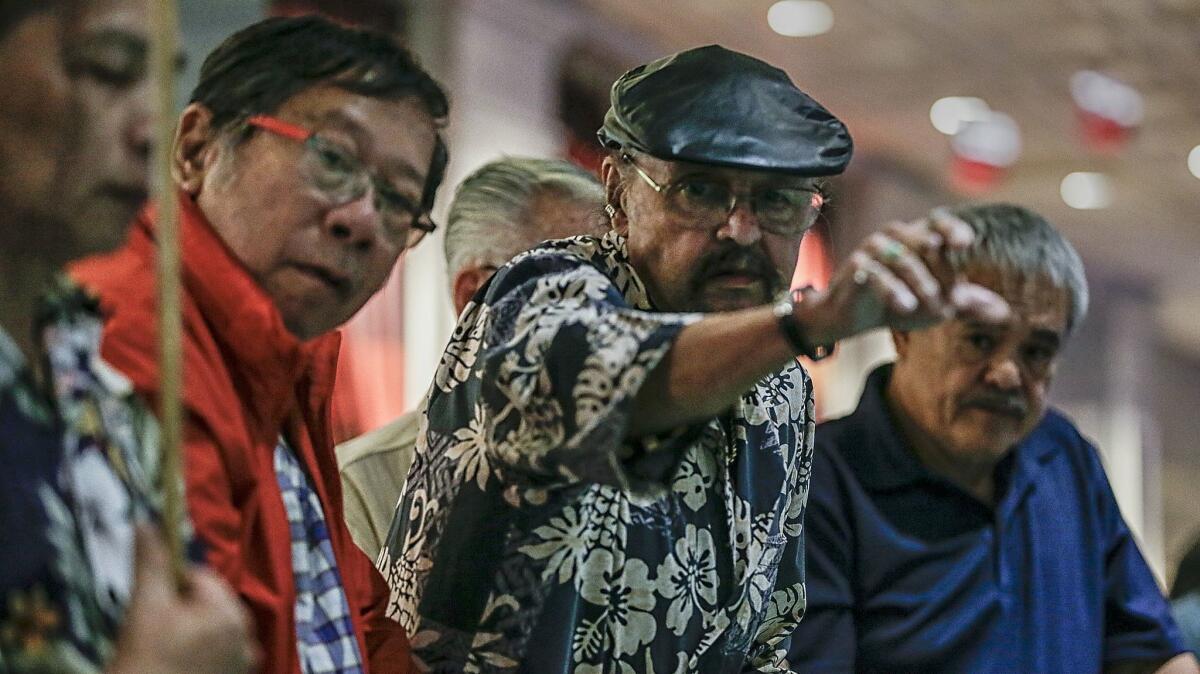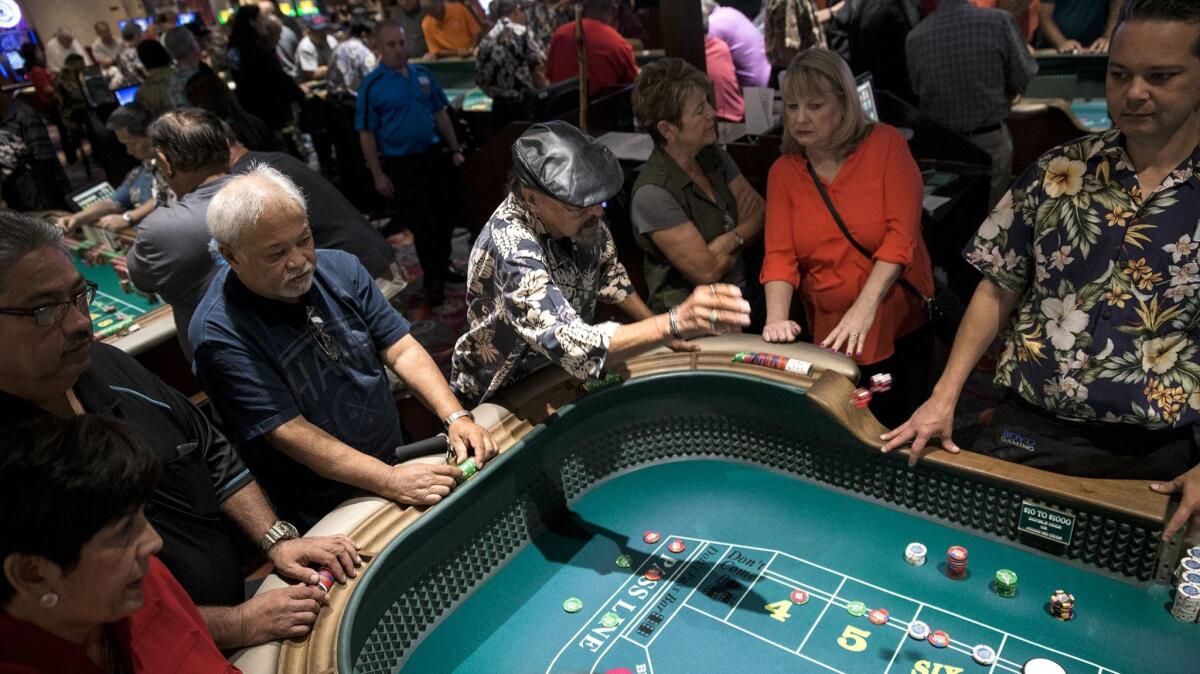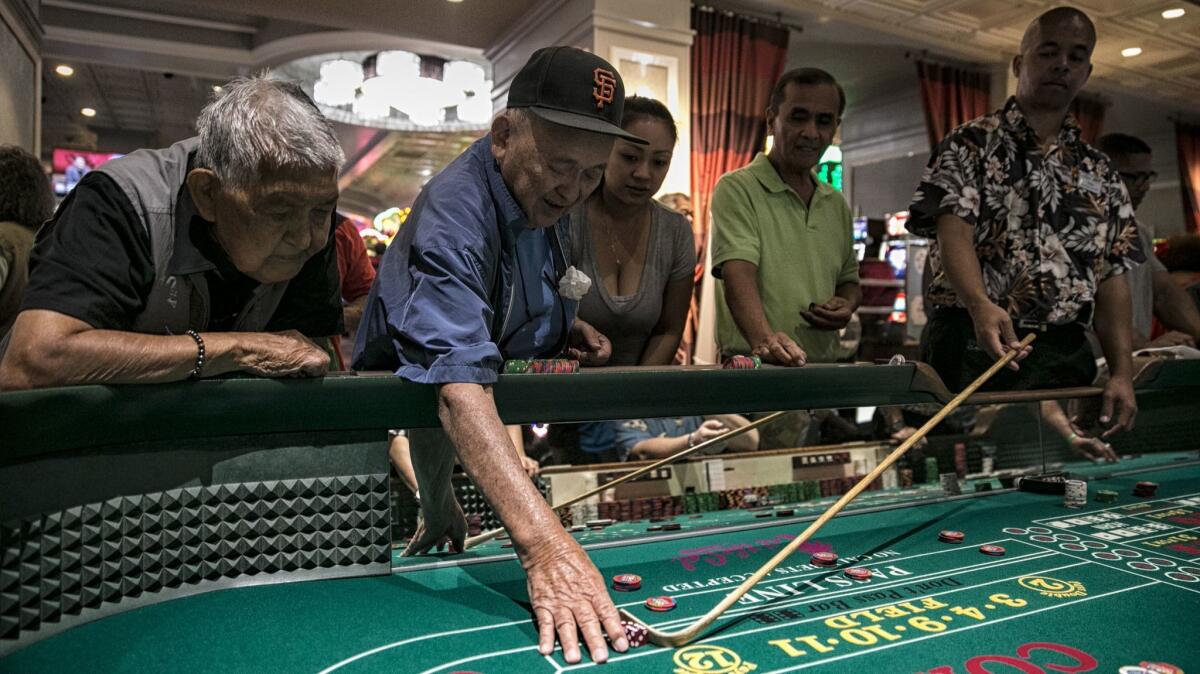A method to their magic: Craps champions swear it’s more mystique than math at the tables in Vegas

Statisticians say the lure of ‚Äúhot dice‚ÄĚ or a ‚Äúhot hand‚ÄĚ has no foundation in reality. But craps players known as Golden Arms -- who have rolled winning dice for more than an hour -- disagree, while casinos say it‚Äôs more math than mystique.
Reporting from Las Vegas ‚ÄĒ Richard Favela rested his hands over the wooden chip tray lining the craps table as the lights from above glinted off rings adorning his lithe, brown fingers.
Favela reached down for the dice and positioned them with great care. Turning them slowly. Methodically. Wholly unsatisfied until he had the white dots facing up the way he liked them. Six on one. Three on the other. They must add up to nine. Always nine. Otherwise the magic would surely end.
A dozen pairs of eyes fixated on him. The four dealers at the table were deferential toward the legend ‚ÄĒ identifiable to the trained eye by his blue shirt. He would not be rushed.
There were four other blue shirts at the table as well ‚ÄĒ each signifying the wearer had rolled dice for longer than an hour without losing. The players are called Golden Arms by the California Hotel and Casino ‚ÄĒ a designation created in 1989 after Stanley Fujitake rolled 118 times over the course of three hours and six minutes. Favela, a four-time Golden Arm, had his longest roll in 2010 when he shot for an hour and 10 minutes.

On a recent Saturday night, Favela and other Golden Arms had descended on the craps tables after attending a banquet honoring their achievements. There was Garton Mau, who rolled 59 minutes that night ‚ÄĒ an impressive 72 rolls ‚ÄĒ and who already was a four-time Golden Arm. Masao Yamamoto, 82, is the only blind Golden Arm and previously had rolled for an hour and 24 minutes. Lionel Cazimero and his wife, Alicia Cazimero, had reached 1:28 and 1:04, respectively.
When they all strolled into the pit, it looked like the 1927 Yankees taking the field.
Craps is among the more favorable table games for players, with just a slight house advantage. But that still doesn‚Äôt explain how someone can avoid crapping out again and again and again ‚ÄĒ the strange collision of math and magic.
The basic rule is simple: Roll a number ‚ÄĒ other than two, three or 12 ‚ÄĒ and then roll that number again before rolling a seven. Between that, there are a lot of bets that can be made on individual numbers, and as long as a seven doesn‚Äôt end the roll, bettors covering numbers can make money each time that number comes up. It‚Äôs not easy to roll a lot before crapping out. A shooter has to roll at least 25 times to even qualify for the Golden Arm tournament. Most don‚Äôt come close.
There‚Äôs a 16.67% probability of throwing a seven, while six and eight check in with the next-best odds ‚ÄĒ a 13.89% chance. Two and 12 are the biggest long-shots ‚ÄĒ at 2.78% chance each. But the magic is what sells the game. It keeps them coming to the edge of the felt, cheering loudly at luck‚Äôs occasional wins and providing sustaining players with a false belief that maybe ‚ÄĒ just maybe ‚ÄĒ this time the rules of math don‚Äôt apply.

On this night at the Cal (as regulars call the California Club) table games manager John Merrick surveyed the craps tables dotted with dozens of blue shirts and red shirts ‚ÄĒ given to female Golden Arms. If past was prologue, it could be a rough night.
‚ÄúMost people don‚Äôt roll for an hour or more,‚ÄĚ Merrick said. ‚ÄúIf they did, I‚Äôd be out of a job.‚ÄĚ
Favela, 77, picked up the dice. Next to him, Jayson Kanekoa ‚ÄĒ another Golden Arm ‚ÄĒ toyed with his chips. In June 2016, he had a magnificent roll that ended up paying for his brother-in-law‚Äôs wedding. The other Golden Arms watched the dice with impassive faces. Favela‚Äôs son, still trying to earn his own blue shirt and keep up the family legacy, stood on the opposite side of the table and let an unlit cigarette dangle from his lips. He once rolled for 45 minutes, he said.
Then the dice were airborne, flying toward the green wall. The table needed six. Richard Favela Jr. said his body tensed. Kanekoa’s mind thought only of the number. Others raised their bodies slightly onto their toes, necks craned.
With a few hard tumbles, the dice settled and yielded their verdict.
‚ÄúSix hard!‚ÄĚ the stickman yelled.
Loud cheers. Clapping. A few swigs from drinks. Chips were paid out around the table. The Golden Arm had paid off again.
‚ÄúI try to control the dice,‚ÄĚ Favela said. ‚ÄúYou try to throw the dice the same way every time and try to hit the same spot every time. This gives me better odds of making a point or some numbers.‚ÄĚ
Well, not exactly.
Arnold Barnett, professor of statistics at MIT, said that the lure of the ‚Äúhot dice‚ÄĚ or ‚Äúhot hand‚ÄĚ has no foundation in reality. The cold, hard facts of math don‚Äôt lie.
He said each roll is its own, independent entity and not connected to the last roll. There are still more combinations of seven on the dice than any other number, giving it the greatest odds of coming up at any given time. Odds, he said, are the way luck is measured.
‚ÄúLuck is defined by the world in different ways,‚ÄĚ Barnett said. ‚ÄúProbability just uses numbers to make clear what events are rare and not so rare.‚ÄĚ
Which explains why big-time shooters are viewed with awe. Other casinos have their versions of interminable rollers ‚ÄĒ Fremont Hotel has its Sharpshooter Club ‚ÄĒ but the Cal has gone all out, including a wall full of plaques for every Golden Arm and a shrine to Fujitake on the casino floor that features a cast of his hand.
The Fujitake roll is the holy grail of craps legend, and those who witnessed it liken it to being present for the Buffalo Bills 32-point comeback to beat the Houston Oilers in a 1993 playoff game.
Fujitake, a quiet, diminutive man from Hawaii, had come down around midnight on May 28, 1989, to start rolling. He rolled. And rolled. And rolled some more.
John Repetti was the casino manager that night and said there was a rule: If the losses started to mount for the casino, he should be awakened at home.
‚ÄúThe first call came and he‚Äôd been shooting for an hour, and we were losing a couple hundred thousand dollars at the time. I said if he continued, to call me at every $100,000 loss interval,‚ÄĚ Repetti said. ‚ÄúWell, the calls kept coming every 15 minutes. Another $100,000. And another $100,000. After the fourth call and fifth call, I decided I‚Äôd better get some clothes on and get downtown.‚ÄĚ
When Repetti arrived, he said the chips were stacked so thick on the numbers, they no longer were visible. The table was full and four deep with people straining to see. He said the casino had run out of $1,000 chips and scrambled to keep up with the payouts.
The Cal lost more than $1 million that night on the table.
But while players embrace mystique, casinos adhere to math.
Dave Lebby, general manager of the Cal and Main Street Station Casinos, said Fujitake-style rolls are outliers, and people like that do something more important.
‚ÄúWe are in the entertainment business,‚ÄĚ Lebby said. ‚ÄúThose big wins are what we call a major loan. So they keep coming back and playing with us.‚ÄĚ

On the recent Saturday, Favela had been shooting dice for about 10 minutes. He‚Äôd closed out a five and was now trying to hit a four. He painstakingly set the dice to nine. His son tensed up again, the unlit cigarette dancing up and down from his lips. Kanekoa caressed the chips ‚ÄĒ four solely on his mind. The routines had been set, the magic had been summoned and the dice went up in the air.
‚ÄúSeven out!‚ÄĚ the stickman called.
Shoulders sagged. Chips were scooped up by the dealers. It was like watching Ted Williams ground into a double play.
‚ÄúI don‚Äôt know what that was,‚ÄĚ Favela said, his fingers clutching a smaller stack of chips.
It was math.
Twitter: @davemontero
ALSO
Coming soon to MGM casinos: advisors to help compulsive gamblers
How to get millennials to gamble? Casinos bet on video games
Las Vegas casinos love Chinese gamblers. So these guys built a casino just for them
More to Read
Sign up for Essential California
The most important California stories and recommendations in your inbox every morning.
You may occasionally receive promotional content from the Los Angeles Times.











